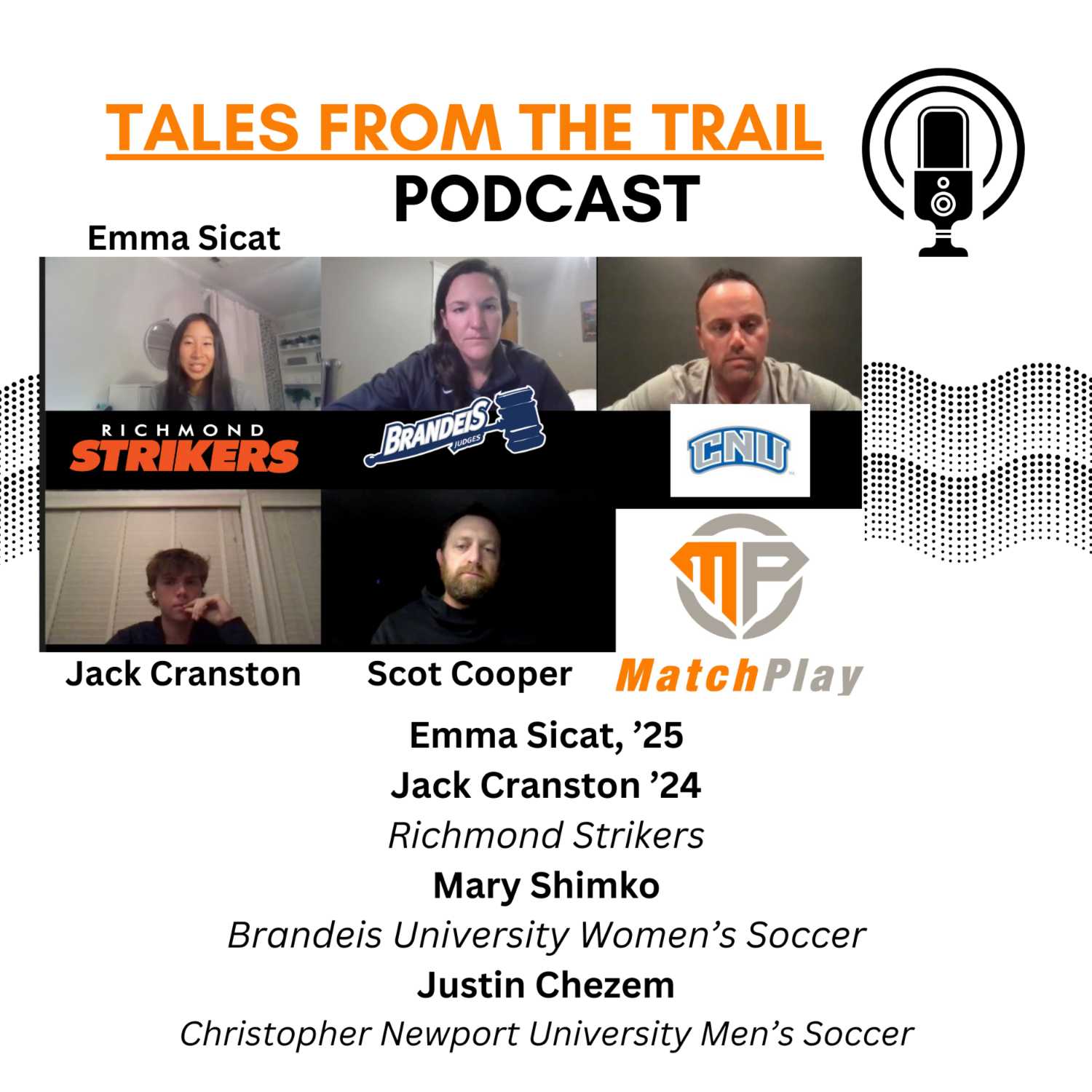40. Richmond Strikers Players, Mary Shimko, Brandeis Women's Soccer, Justin Chezem, Christopher Newport Men's Soccer
- Author
- Scot Cooper
- Published
- Thu 26 Oct 2023
- Episode Link
- https://rss.com/podcasts/tales-from-the-trail-1/1189591
In this episode I welcome two current youth players and two college coaches. Mary Shimko, the head coach of women’s soccer at Brandeis University and Justin Chezem of Christopher Newport University have a great conversation with two members of the Richmond Strikers, Jack Cranston, a defensive midfielder on the Boys U19 Elite boys team and Emma Sicat, of the U19 Elite girls team. Both student-athletes want to continue playing in college and have the opportunity to ask questions of the coaches and vice versa. There is a ton of useful guidance that applies to everyone and insights into how coaches think about recruiting. A big thank you to Glenn Gray, a previous guest of the podcast, who is the college advisor for the Richmond Strikers for helping make this happen.
The conversation covers various aspects of the recruiting process, including communication with coaches, academic requirements, the importance of showcases and ID camps, and the use of marketing skills. The chapters provide insights into what coaches look for in recruits, the frequency of updates to coaches, and the importance of personalizing emails. The conversation also touches on the emotions and timeline involved in the recruiting process. The conversation covers various aspects of the college soccer experience, including the importance of the overall college experience, life outside of soccer, choosing the right school, handling rejection, alternative paths, staying involved in the sport, financial considerations, having financial discussions with coaches, knowing where you stand with coaches, and recruiting timelines.
The college experience is about more than just soccer, so it's important to consider factors such as location, campus culture, and academic programs when choosing a school.
Not every player will have the opportunity to play consistently or at all in college, so it's crucial to find a school where you will be happy and fulfilled regardless of your playing time.
The transfer portal is an option for players who are unhappy with their initial college choice, but it's best to choose a school where you can see yourself being happy for four years.
If you don't receive an offer from your top choice schools, it's important to have alternative plans and consider other ways to stay involved in the sport, such as refereeing or coaching.
Having open and honest conversations with coaches about financial considerations is crucial, as it can impact your ability to attend a particular school.
Knowing where you stand with coaches and asking for feedback can help you gauge your chances of being recruited and make informed decisions about your college options.
Chapters
00:00 Introduction and Coach Noah
01:08 What Coaches Look for in Recruits
02:53 Academic Requirements for Recruits
04:04 Initiating and Maintaining Communication with Coaches
06:02 Frequency of Updates to Coaches
08:40 Number of Schools on Recruit's List
10:25 Geographical Considerations in Recruiting
11:25 Upcoming Showcases and Tournaments
13:32 Importance of Showcases and ID Camps
18:01 Using Marketing Skills in the Recruiting Process
21:08 Choosing Business and Marketing as Majors
24:26 Important Information to Include in Emails to Coaches
33:52 Emotions and Timeline in the Recruiting Process
42:16 The Importance of the College Experience
43:07 Life Outside of Soccer
44:21 Choosing the Right School
45:19 The Transfer Portal
46:20 Handling Rejection
47:13 Alternative Paths
49:24 Staying Involved in the Sport
51:29 Financial Considerations
55:38 Having Financial Discussions with Coaches
59:16 Knowing Where You Stand with Coaches
01:04:17 Recruiting Timelines
